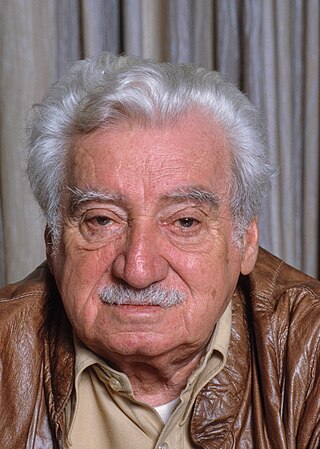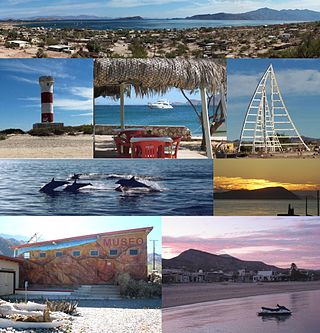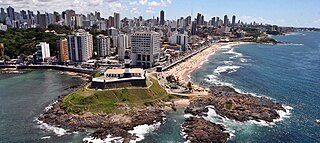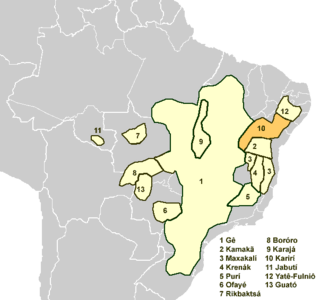
Gilberto Passos Gil Moreira, is a Brazilian singer-songwriter and politician, known for both his musical innovation and political activism. From 2003 to 2008, he served as Brazil's Minister of Culture in the administration of President Luiz Inácio Lula da Silva. Gil's musical style incorporates an eclectic range of influences, including rock, Brazilian genres including samba, African music, and reggae.

Esporte Clube Vitória is a Brazilian professional club based in Salvador, Bahia founded on 13 May 1899. It competes in the Campeonato Brasileiro Série A, as well as in the Campeonato Baiano, the top flight of the Bahia state football league.

Esporte Clube Bahia is a Brazilian professional football club, based in Salvador, capital city of the Brazilian state of Bahia. The club competes in the Campeonato Baiano, Bahia's state league, and the Campeonato Brasileiro Série A, highest division of Brazilian football league system.

Bahia is one of the 26 states of Brazil, located in the Northeast Region of the country. It is the fourth-largest Brazilian state by population and the 5th-largest by area. Bahia's capital is the city of Salvador, on a spit of land separating the Bay of All Saints from the Atlantic. Once a stronghold of supporters of direct rule of Brazil by the Portuguese monarchy, and dominated by agricultural, slaving, and ranching interests, Bahia is now a predominantly working-class industrial and agricultural state. The state is home to 7% of the Brazilian population and produces 4.2% of the country's GDP.
Marcel Camus was a French film director. He is best known for Orfeu Negro, which won the Palme d'Or at the 1959 Cannes Film Festival and the 1960 Oscar for Best Foreign Language Film.

Jorge Amado was a Brazilian writer of the modernist school. He remains the best-known of modern Brazilian writers, with his work having been translated into some 49 languages and popularized in film, including Dona Flor and Her Two Husbands in 1976. His work reflects the image of a Mestiço Brazil and is marked by religious syncretism. He depicted a cheerful and optimistic country that was beset, at the same time, with deep social and economic differences.

Bahía de los Ángeles is a coastal bay on the Gulf of California, located along the eastern shore of the Baja California Peninsula in the state of Baja California, Mexico. The town of the same name is located at the east end of Federal Highway 12 about 42 miles (68 km) from the Parador Punta Prieta junction on Federal Highway 1. The area is part of the San Quintín Municipality.

The São Francisco River is a large river in Brazil. With a length of 2,914 kilometres (1,811 mi), it is the longest river that runs entirely in Brazilian territory, and the fourth longest in South America and overall in Brazil. It used to be known as the Opara by the indigenous people before colonisation, and is today also known as "Velho Chico".

Candomblé is an African diasporic religion that developed in Brazil during the 19th century. It arose through a process of syncretism between several of the traditional religions of West and Central Africa, especially those of the Yoruba, Bantu, and Gbe, coupled with influences from Roman Catholicism. There is no central authority in control of Candomblé, which is organized around autonomous terreiros (houses).

Bahía Blanca is a city by the Atlantic Ocean, in the southwest province of Buenos Aires, Argentina. It is the seat of government of the Bahía Blanca Partido, with 301,572 inhabitants according to the 2010 census [INDEC]. Bahía Blanca is the principal city in the Greater Bahía Blanca area.

Salvador is a Brazilian municipality and capital city of the state of Bahia. Situated in the Zona da Mata in the Northeast Region of Brazil, Salvador is recognized throughout the country and internationally for its cuisine, music, and architecture. The African influence in many cultural aspects of the city makes it a center of Afro-Brazilian culture. As the first capital of Colonial Brazil, the city is one of the oldest in the Americas. Its foundation in 1549 by Tomé de Sousa took place on account of the implementation of the General Government of Brazil by the Portuguese Empire.
Baenan is a poorly attested language of Brazil. The last remaining speaker lived in Bahia, Brazil in 1940. The language of this speaker was associated with the Baenan language as the last members of the Baenan tribe lived in Paragaçú, Bahia, near where the language was attested.

The Karirí languages, generally considered dialects of a single language, were a group of languages formerly spoken by the Kiriri people of Brazil. It was spoken until the middle of the 20th century; the 4,000 ethnic Kiriri are now monolingual Portuguese speakers, though a few know common phrases and names of medicinal plants.

Igaporã is a municipality in the state of Bahia in the North-East region of Brazil. It is located in the semi-arid sertão region in the interior of the state. It had an estimated 15,650 inhabitants as of 2020. It covers 836.586 square kilometres (323.008 sq mi) and is 682 kilometres (424 mi) from the state capital, Salvador. It is located in the southwest region of Bahia close to the Chapada Diamantina, a mountainous region of the state. Igaporã became an independent municipality by the State Law 556 of March, 25th 1953, and its territory was dismembered from the neighboring municipality of Caetité.

Glória is a municipality in the state of Bahia in the North-East region of Brazil. Glória covers 1,255.56 km2 (484.77 sq mi), and has a population of 15,234 with a population density of 13 inhabitants per square kilometer. It is located on the border of the states of Bahia, Pernambuco, and Alagoas on the banks of the Moxito River, now a lake as the result of the construction of Moxito Hydroelectric Power Plant.

The Kamakã languages are a small family of extinct Macro-Jê languages of Bahía, northeastern Brazil. The attested Kamakã languages are:
Katembri–Taruma is a language family proposed by Kaufman (1990) that links two extinct or critically endangered languages of South America:
Cristóvão Jaques, also known as Cristóvão Valjaques, was a Portuguese noble of Aragonese descent.
Katembri was a divergent language of Bahia, northeastern Brazil that appears to be distantly related to Taruma.
Tuxá was the eastern Brazilian language of the Tuxá people, who now speak Portuguese. The language ceased being spoken in the late 19th century, but in the 1960s a research team found two women that had been expelled from the Tuxa tribe in Bahia who knew some thirty words.













